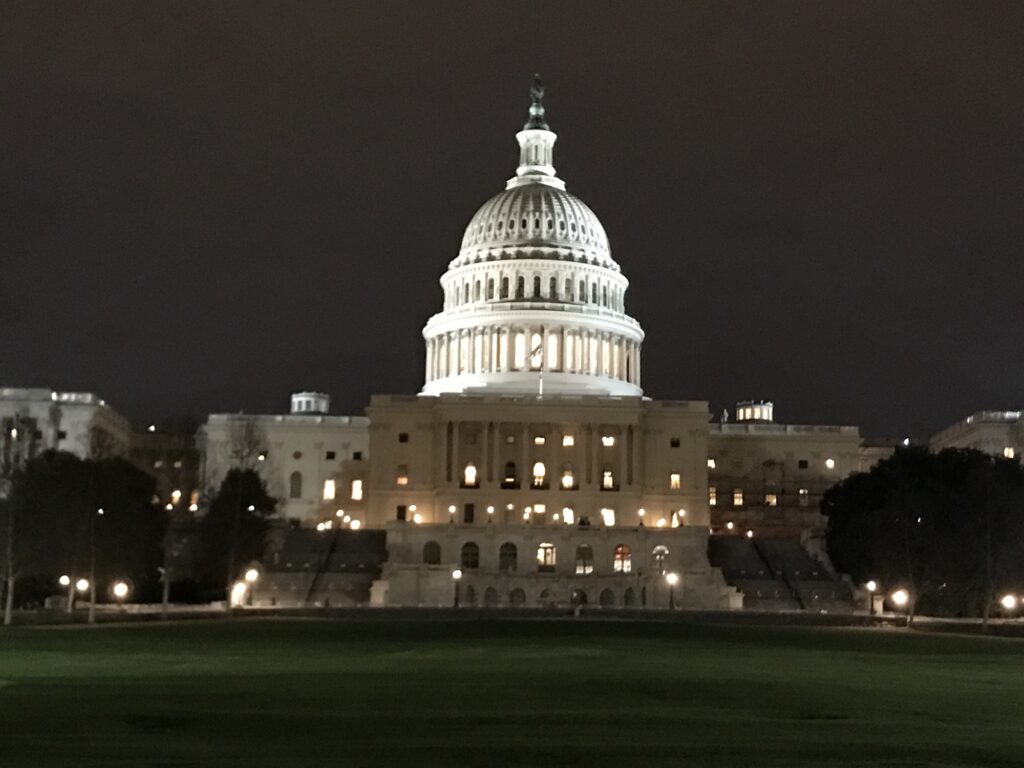
By Africa Bazaar StaffWriter | September 29, 2025
Washington, D.C. —Washington is once again on the edge of a government shutdown. Unless Congressional leaders strike a deal before the midnight deadline on September 30, large parts of the federal government could grind to a halt, with consequences rippling far beyond America’s borders.
On Monday, House Speaker Mike Johnson, Senate Minority Leader Chuck Schumer, and House Minority Leader Hakeem Jeffries met with President Trump and other senior White House officials at the White House to negotiate a stopgap measure. The proposal under discussion: keep the government funded at current levels for six weeks—through mid-November—while longer-term budget disputes continue.
Democrats are pressing for restored healthcare-related funding, while Republicans want a clean, short-term extension. Behind the scenes, the White House has already warned agencies to prepare for sweeping furloughs and layoffs of federal workers whose roles are not “mandated by law” or aligned with administration priorities.
Shutdowns have become an increasingly common political weapon in Washington. But history shows they rarely deliver the policy wins their architects hope for. The Clinton-era shutdowns of 1995–96, the 16-day standoff over Obamacare in 2013, and Trump’s own record-breaking 35-day shutdown of 2018–19 all ended in political stalemate.
Still, the global economy pays a price—especially U.S. trading partners in Africa.
The Africa Trade Stakes
While a shutdown may sound like an insular, domestic fight, with U.S.-Africa trade volumes higher than ever, a shutdown in Washington is no longer a contained crisis. It will reverberate through factories in Nairobi, cocoa farms in Ghana, and ports in Lagos.
For African economies already navigating global currency volatility, supply chain disruptions, and rising borrowing costs, Washington’s budget brinkmanship adds yet another layer of uncertainty if it goes dark.
In 2024, U.S.-Africa trade in goods and services totaled $104.9 billion, with U.S. exports reaching $32.4 billion and imports from Africa at $39.6 billion, according data from the United States Trade Representative office. Much of that trade is underpinned by the African Growth and Opportunity Act (AGOA), a preferential trade program that gives duty-free access to U.S. markets for many African goods. But AGOA is itself up for renewal—and a prolonged shutdown could delay legislative action, leaving African exporters in limbo.
Beyond AGOA, a shutdown will interrupt the machinery of trade, stalls ongoing trade negotiations such as the newly revived U.S.- Kenya bilateral Trade Agreement—which initially began talks and negotiation in 2020 during the Trump 1.0 administration but was paused due to the COVID-19 pandemic, and is now in its fifth year of negotiations and third administration—Trump 1.0-Biden-Trump 2.0, cooling momentum for new agreements and broader investment frameworks with other countries, slow customs, tariff processing, and export support programs.
While essential cargo processing will continue, delays and uncertainty could erode Africa’s competitiveness in U.S. markets. Even a short shutdown risks undermining trust in America as a reliable trade partner, experts warn.
Critical trade agencies such as the U.S. Trade Representative’s office, Commerce, and Treasury are expected to operate at reduced capacity. Even if trade flows don’t stop, “friction, uncertainty, and delays” pile up.
U.S. Chamber of Commerce Executive Vice President and Chief Policy Officer Neil Bradley in a statement urged Congress and the Trump Administration work together to prevent a government shutdown.
“Government shutdowns are harmful to the economy, our national security, and the American people, often in ways that are not immediately obvious,: said Bradley. “In communities across the country, businesses and Americans rely on the functions of government. From passports and permits to clinical trials and air travel, a well-functioning economy requires a functioning government.”
Why Shutdowns Matter More Abroad
Unlike domestic constituencies, African exporters cannot easily absorb the shocks of U.S. dysfunction. Smaller or newer businesses are especially vulnerable. A delayed customs clearance or missed tariff preference can erase their margins entirely.
South Africa is one of those African countries that cannot afford an additional negative impact on its economy from a U.S. Government shutdown. The Trump’s 30% reciprocal tariff imposed on the country this year plus the U.S. government cuts to foreign aid are already having significant negative impacts on the South African economy, prompting the government as well as other African countries to seek better and more friendlier trade pasture elsewhere.
Meanwhile, U.S. importers on the continent may look elsewhere if regulatory clarity fades, undermining the reliability of Africa as a supplier—and the reliability of the U.S. as a partner.
A Familiar, Costly Drama
With AGOA’s renewal already hanging in the balance, a shutdown risks signaling that Africa is a low priority in Washington, just as China and the EU are deepening their own trade ties across the continent.
For Africa, the concern isn’t only about one missed shipment or delayed tariff exemption. It’s about trust. As China and the EU expand their footholds on the continent, Washington’s budget brinkmanship risks sending a damaging signal: U.S. partnership comes with uncertainty.
Whether or not Congressional leaders and President Trump reach a deal by midnight, the spectacle of shutdown politics undermines confidence in America’s reliability as a trade partner. For Africa, that erosion of trust may be as damaging as the immediate disruptions themselves.




